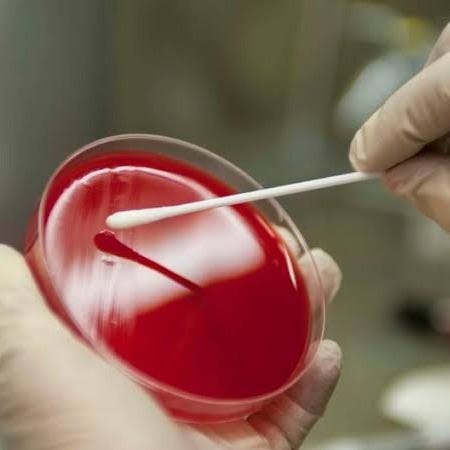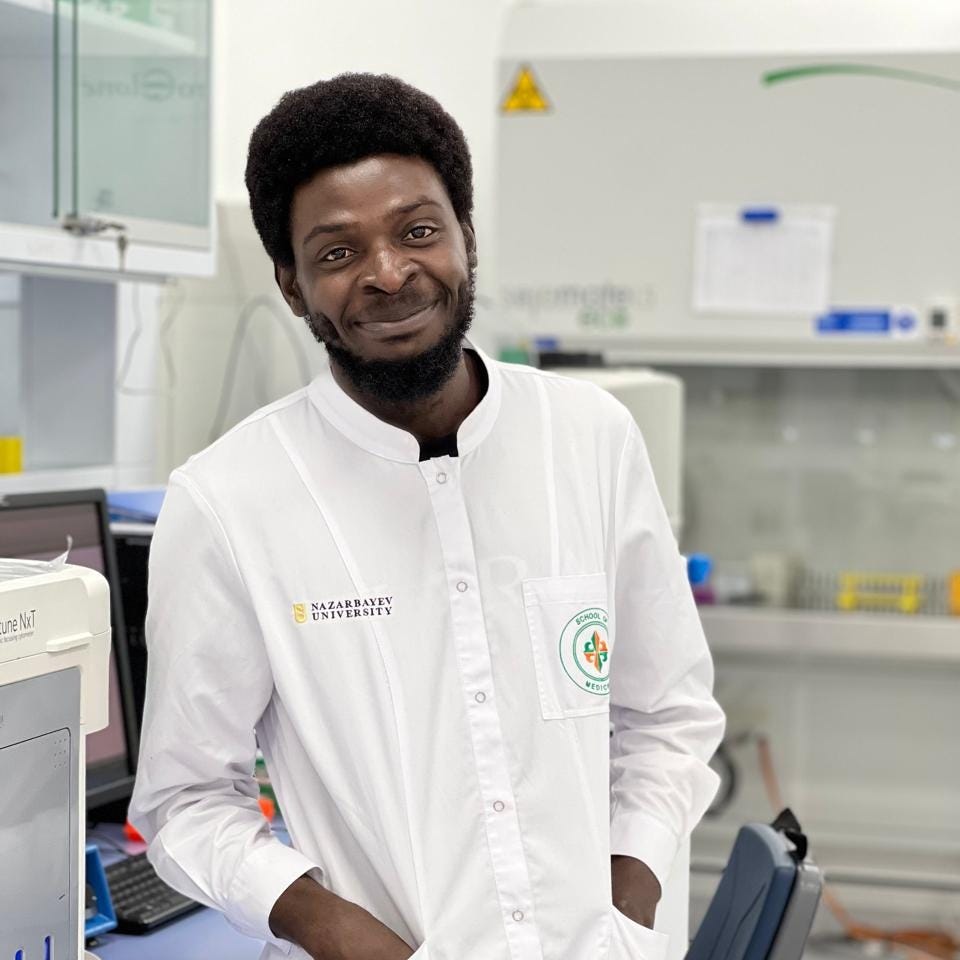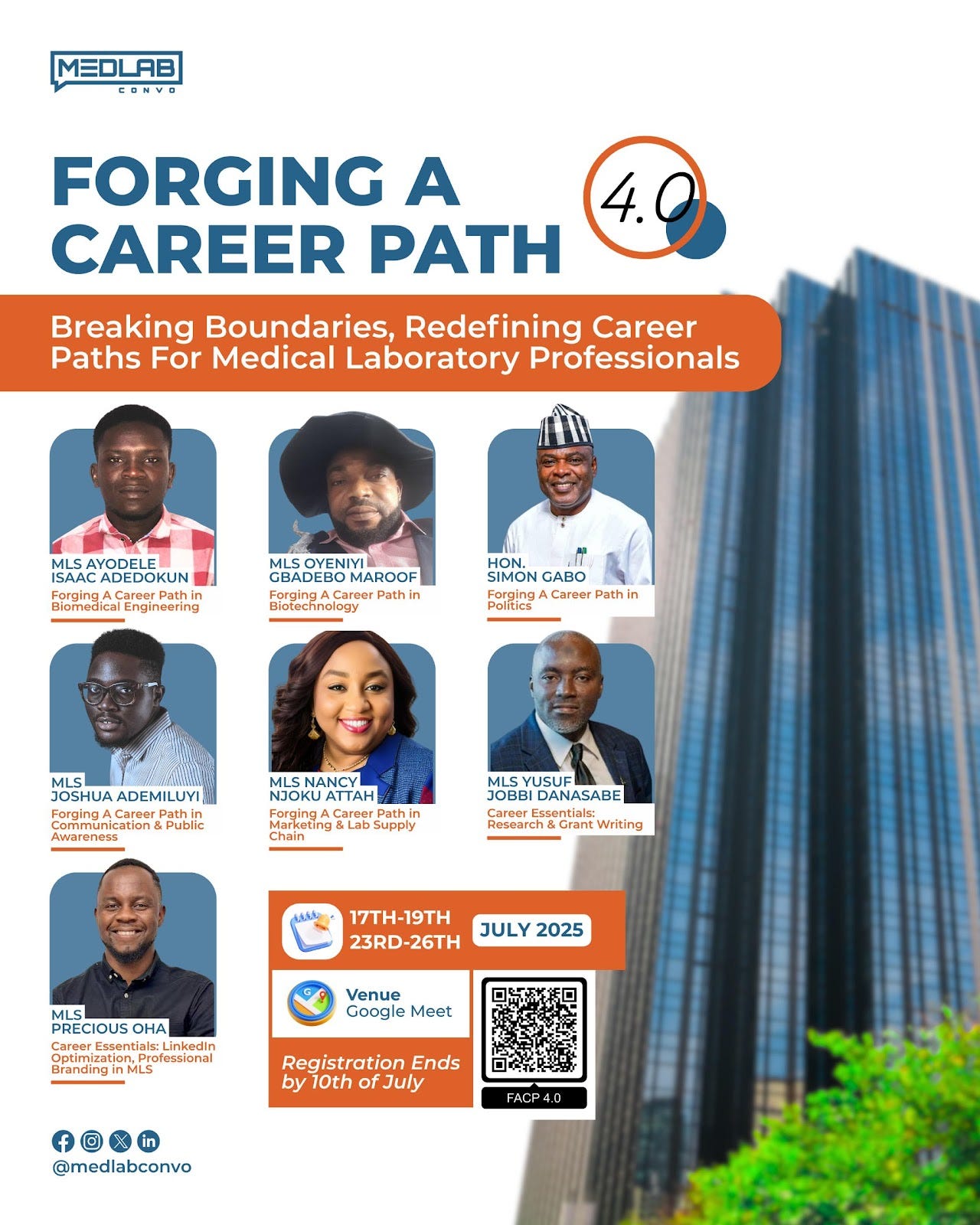DIVIDE AND CONQUER
Employing Diversity in Solidifying a Career Path in Medical Laboratory Science
AIM:
This article aims to help you explore how medical laboratory science intersects with other medical career paths, highlighting opportunities for collaboration, specialization, and career advancement beyond traditional laboratory roles.
GIVEN:
Medical Laboratory Science (MLS), Interdisciplinary Careers, Molecular Medicine, Biomedical Engineering, Healthcare Innovation.
METHOD:
Expository Essay
PRINCIPLE:

“I give up control” Faith* hummed as she geared up in her lab coat, getting ready to work. The morning was chill as the A.C in the laboratory blew cold air, she wore a pair of gloves and sat down. Under the biosafety cabinet, she placed several petri dishes to read. She had started chanting in her head “let all the patients have a zone of inhibition, please.” But after reading 20 samples, about 7 patients had no zone of inhibition. She got bothered and her mind held by the thought of antimicrobial resistance becoming more resilient in flaunting its power, and most importantly, what could she do to improve things? Faith had always had a propensity for pharmacology; she loved it while being taught in school. However, she was confused. She loved Medical Laboratory Science but she thought only the four/five specialities could be majored in for postgraduate up until that night as she chatted with Divine, in her hot room. She told him of her dream to do a master's in pharmacology to discover novel drugs that could help fight antimicrobial resistance, and help educate patients on drug usage. She expected him to laugh at her and confirm her fears of being unserious. Instead he told her to go for it, and said: “Remember our pharmacology lecturer? He was an MLS Major.”
Faith jolted up, he couldn't be serious, could he? Divine* affirmed that he wasn't joking; their pharmacology lecturer first degree was indeed MLS. Faith squealed and screamed in glee. Finding a role model in the medical laboratory science profession can be instrumental in helping her navigate and define her career path.
Unfortunately, only a few medical laboratory science professionals and students recognize that career aspirations aren’t confined to the traditional theoretical specialties. This article aims to broaden that perspective by highlighting how embracing diversity can help solidify a meaningful and fulfilling career path.
PROCEDURE:
Symbiosis: A Catalyst for Growth Beyond the Bench
The desire to diversify and spread out one's tentacles as an MLS major is one that burns in the heart of many. It usually manifests as an irresistible need to dive out of the traditional bench work and explore other career paths. Fortunately, there are many career paths that can be explored as a medical laboratory scientist; it could be public health, pharmacology, molecular medicine, vaccine science and so much more. These fields aren’t random detours; they share a kind of symbiosis made possible by the strong foundation that Medical Laboratory Science provides.
Symbiosis is defined as the coexistence of two different microorganisms, where the two benefit from one another. This can be used as an analogy to show how medical laboratory scientists can benefit from other fields of medical courses and carve a career path for themselves there. A perfect example was seen during the global health pandemic that hit the world in 2020, medical laboratory scientists worked as public health personnel and researchers in the diagnosis of COVID-19. There was the conduct of virological testing, development of vaccines, and use of polymerase chain reaction (PCR) for diagnostic testing. This showed how medical laboratory scientists can find relevance in areas such as public health and molecular medicine and help in patient health care.
Let's take a look at molecular medicine and pharmacology for instance and its symbiosis with medical laboratory science. In pharmacology, the scientific study of the effects of drugs, there is a synergy with medical laboratory science as you can specialize in pharmacology in postgraduate studies and your experience in quality control, use of High-performance liquid chromatography, enzyme linked immunosorbent assay, and lessons learnt about drugs in school will prepare you, and furthermore you could link your knowledge and work as a toxicologist checking the rate of drugs and toxins on living organisms.
In molecular medicine, the diagnosis of pathological conditions through the analysis of biological samples at the molecular level closely aligns with the principles and practices of medical laboratory science. This is demonstrated in the story of Gaius Bala, a student of Kazakhstan University pursuing a masters in Molecular Medicine.
“I was interested in Histopathology from the get-go, but I knew it exceeded just Hematoxylin & Eosin staining, or PAP stain. The intricacy of immunohistochemistry caught my attention, and the joy of learning diagnostic techniques at the molecular level began to take root in my heart. I decided to plunge into studying molecular medicine and decided to integrate it with medical laboratory science, as the diagnostic aspects of diseases can now be done on genetics level. And, furthermore, diseases can be prevented when studied at a molecular level.”

Gaius’s story is a clear reminder that the path of a medical laboratory scientist doesn’t have to be a solitary one. Across the healthcare spectrum, there are natural points of connection where skills, knowledge, and purpose overlap. This symbiosis offers a powerful opportunity to grow, collaborate, and make even greater impact beyond the traditional boundaries of the laboratory.
Growing From the Bedrock of Modern Medicine
Medical Laboratory Science is the bedrock of modern medicine and this means that branching out of the conventional is doable. A brilliant and fascinating part of practicing a profession like Medical Laboratory Science is that while it is practiced broadly in four/five specialities; it provides all the foundational knowledge needed for several other career paths outside of the conventional, and even spurs your passion for them.
Take for instance, most Nigerian students take a third year course on Biomedical Engineering. This course teaches the laws and the mechanisms behind laboratory equipment and machines. This particular course can be majored in as you could work as a Biomedical engineer ensuring that patient health care is improved by innovation of medical devices. There's also Health communication as is the case of Chidindu who studied Medical Laboratory Science, but uses her platform to channel discourse on public health issues, dissecting it from a medical laboratory scientist perspective. In the similitude of what she does, you can also pivot and input your digital skills by breaking down the myths surrounding health issues; emphasizing the reason for running certain laboratory tests like Liver Function Test (LFT), Kidney Function Test (KFT), which may sound like gibberish to your patients. By demystifying these health concepts, you take up a new role as a health communicator.
With the foundation of modern medicine in your arsenal, the profession offers you a valid strong standpoint that gives you an edge; a bedrock to build on. We have highlighted a few paths you can choose to diversify into and have brought you living proofs. These are just a drop in the ocean of possibilities available to you as a medical laboratory scientist. And we understand that the ocean looks daunting to step into, but here are some tested and trusted tips on how to make that jump.
ATTEND SEMINAR THAT CAN EXPAND YOUR HORIZON. For most of the persons who were aforementioned who diversified, they attended seminars that opened their mind to possibilities in the MLS space, an example of such is the Forging a Career Path organized by MedLabConvo. Here medical laboratory science professionals who transitioned into public health, health politics, and other courses shares their insights on how they made the transition.
GET A ROLE MODEL. The next tip is to find one who has walked this path you want to walk in, and then make enquiries. Build a cordial relationship with them and seek advice for every thorn that presents itself on your path.
DARE TO MAKE YOUR DREAM COUNT. Like the story of Faith who wanted to extend her phalanges to Pharmacology but was scared, it's necessary to push yourself out of your comfort zone and make your dream count, which will lead to the next point.
SURROUND YOURSELF WITH GREAT MINDS. It's of utmost importance to surround yourself with persons who can help your dreams become an actual reality, be accountable to people who will see that you grow in your professional pursuit.

COMMENT
We are finally coming to a place in society and in the healthcare industry where it is considered a thing of pride to be a medical laboratory scientist, our professional identity is becoming more solid and we are pleased to be part of this time. However, this identity doesn't have to be limited to what we currently have obtainable in practice (bench work, research, academics, etc.) Our identities can be carved outside of the box. The knowledge MLS gives us is one that gives us an edge and advantage to diversify. This article can be the start for you; a wake up call to divide and conquer your goals.
RECOMMENDATION
Branching out of medical laboratory science and the conventional bench work may seem daunting, it definitely isn't a walk in the park, but with grit, resilience, you can make that bold step. Here are some recommendations to keep in mind:
Don't stay stuck in fear. It's of utmost importance not to stay in the orbit of fear, but rather jump into taking actions that will lead you into becoming what you want as a medical laboratory scientist. You could catch up on our forging career path sessions to hear the insights of other medical laboratory scientists who branched out to other parts, and didn't stay stuck in fear.
Invest in educational growth: Another key concept you have to consider when considering diversifying is to invest in your mind. You can start at any level and begin to accrue skills. If you have an interest in health communications, take a course on digital communications, in pharmacology, explore courses on online platforms that align with your interest, if you wish to make an impact beyond the MLS space, check our resources at MedLabConvo.
Carve Your Niche. Another key step in building a meaningful career is to begin branding yourself in the path you’ve chosen. Take time to read widely about your area of interest so you can speak confidently and knowledgeably about it. Most importantly, start talking about your new direction. Share your journey, interests, and insights on social media or any platform available to you. Personal branding is a powerful tool for scientists to position themselves, attract opportunities, and inspire others.
Volunteer and Network. It is essential to actively seek out volunteer opportunities and hands-on experiences within your chosen field of study. These real-world exposures not only help you build practical skills and deepen your understanding but also allow you to network with professionals, discover your specific areas of interest, and strengthen your overall career direction.




Such an illuminating piece
If I am ever given the floor to talk about the clarity I've gotten on how to navigate my career within and without the Med Lab sphere, we fit no go. This was an illuminating piece and a good reminder.